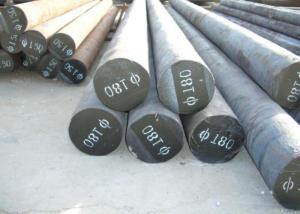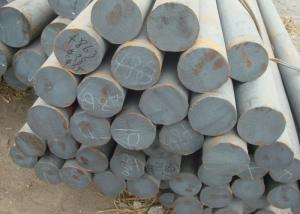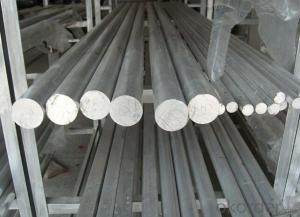Spring Steel 60Si2CrA
- Loading Port:
- China Main Port
- Payment Terms:
- TT or LC
- Min Order Qty:
- 50MT m.t.
- Supply Capability:
- 600000TONS/YEAR m.t./month
OKorder Service Pledge
OKorder Financial Service
You Might Also Like
Spring Steel:
Spring steel is divided into two types, one is alloy spring steel, and other one is carbon spring steel.
Alloy spring steel is a type that is used for manufacturing springs and other elastic parts. Spring steel should have high ratio of yield strength and tensile strength and elastic limit to make sure that the springs obtain enough power of elastic deformation and can bear much load.
Types of alloy spring steel: Si-Mn spring steel, Si-Cr spring steel, Cr-Mn Spring steel, Cr-V spring steel and so on.
Specification of Spring Steel 60Si2CrA
-Material: 60Si2CrA
-Standard: GB/T 1222-1984
-Type: Spring Steel
Corresponding Steel Grade for Reference:
CHN, GB | JPN, JIS | GER, DIN | GBR, BS |
60Si2CrA | SWOSC-V | 67SiCr5 | 685H57 |
USA, AISI/SAE/ASTM | ISO | ||
9254 | 55SiCr63 |
Chemical Composition:
C | Si | Mn | S |
0.52~0.60 | 1.5~2.00 | 0.60~0.90 | ≤0.035 |
P | Cr | Ni | Cu |
≤0.035 | ≤0.35 | ≤0.35 | ≤0.25 |
Mechanical Properties:
-Tensile Strength σb (MPa): ≥1274(130)
-Yield Strength σs (MPa): ≥1176(120)
-Elongation δ10(%): ≥6
-Percentage reduction of area: ψ (%): ≥30
-Hardness:
1, Hot rolled, ≤302HB
2, Cold drawn + Heat treatment: ≤321HB
-Norm of heat treatment: quenching 870℃±20℃
-Micro structure: Tempered troostite.
Usage/Applications of Spring Steel 60Si2CrA
-Compared with Si-Mn spring steel under the similar condition of plasticity, 60Si2CrA have higher tensile strength, yield strength and hardenability.
-60Si2CrA is applied for producing springs with working temperature below 300~500℃. This type of spring can bear high stress, for example, governor spring, turbine steam seal spring, etc…
Packaging & Delivery of Spring Steel 60Si2CrA:
-Packing Detail:
1, The products can be packed in bundles by steel wires.
2, The weight of each bundle no exceed normally 3 tons
-Marks: there are two types of marks. One is tag mark, for showing customers the specifications of products, company name and logo and other information required by customers. Other one is color marks. They are used to make the products more evident so that it’s easy for customers to distinguish them from other products at destination port.
-Delivery Detail: 30~45 working days after receive buyer’s T.T. or L/C.
Transportation:
-The products can be delivered by bulk vessel or by container. As for container, products with the length of 6m will be loaded in 20’ container, with 9m or 12m, in 40’ container.
-The maximum quantity of loading of container is 25 tons.
-The products are usually transported to the nearest port from the production place.
Payment:
-Invoicing on theoretical weight or actual weight as customer’s request.
-FOB, CFR or CIF.
-Terms of payment: T.T. or L/C at sight.
Photos of Spring Steel 60Si2CrA:
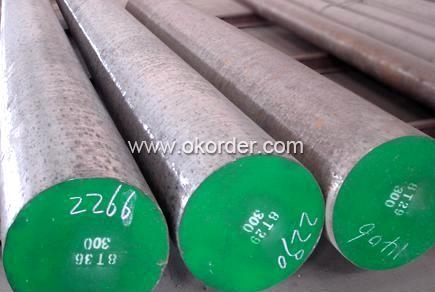
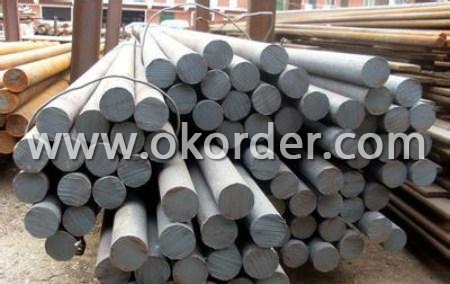
- Q:Is special steel suitable for medical equipment manufacturing?
- Yes, special steel is suitable for medical equipment manufacturing. Special steel possesses properties such as high strength, corrosion resistance, and biocompatibility, making it an ideal choice for producing medical devices and equipment. Its ability to withstand harsh sterilization processes and maintain structural integrity is crucial in the medical field, ensuring the safety and reliability of the equipment.
- Q:How does special steel contribute to the aerospace industry?
- Special steel plays a crucial role in the aerospace industry by providing exceptional strength, high temperature resistance, corrosion resistance, and other mechanical properties necessary for aircraft components. It is used in the manufacturing of critical parts such as landing gear, engine components, structural frames, and fasteners, ensuring safe and reliable operation of aircraft. Additionally, special steel's lightweight nature enables improved fuel efficiency and allows for the design of more aerodynamic and efficient aircraft, ultimately contributing to the advancement and growth of the aerospace industry.
- Q:What are the main factors that determine the cost of special steel?
- The cost of special steel is primarily determined by several key factors. Firstly, the composition of the steel plays a significant role in determining its cost. Special steels often have specific alloying elements added to enhance their properties, such as corrosion resistance, strength, or heat resistance. The cost of these alloying elements can vary widely, and the greater the quantity and complexity of the alloy, the higher the cost of the steel. Secondly, the manufacturing process used to produce the special steel can greatly impact its cost. Special steels often require more intricate and controlled manufacturing processes compared to regular steel. These processes may involve additional steps such as precise heat treatment, forging, or casting, which can increase the overall cost of the steel. Another crucial factor influencing the cost of special steel is market demand and availability. If a particular type of special steel is in high demand but limited supply, the cost tends to rise. Conversely, if there is a surplus of a specific type of special steel, the cost may decrease. Market forces, including global supply and demand dynamics, can significantly impact the cost of special steel. Moreover, the quality and certification of the special steel can also affect its cost. Higher-quality steel that meets stringent industry standards and certifications may often command a higher price due to the additional testing, quality control, and documentation required. Transportation and logistics costs are also important factors to consider. If the steel needs to be transported over long distances or requires specialized handling, it can add to the overall cost. Lastly, economic factors such as currency exchange rates, inflation, and government policies can impact the cost of special steel. Fluctuations in exchange rates can affect the cost of raw materials and manufacturing equipment, which in turn influence the final price of the steel. Government policies, such as import and export tariffs or subsidies, can also impact the cost of special steel. In summary, the main factors that determine the cost of special steel are the composition, manufacturing process, market demand and availability, quality and certification, transportation and logistics, and economic factors. Understanding these factors is crucial for both buyers and sellers of special steel to make informed decisions and ensure competitive pricing.
- Q:How does special steel contribute to reducing maintenance costs?
- Special steel contributes to reducing maintenance costs by offering enhanced durability, corrosion resistance, and wear resistance properties. This means that components made from special steel have a longer lifespan and require less frequent maintenance or replacement. Additionally, special steel can be designed to withstand extreme conditions, reducing the risk of failures and breakdowns, ultimately leading to lower maintenance costs.
- Q:How does special steel meet the requirements of specific industries?
- Special steel meets the requirements of specific industries by offering superior characteristics such as high strength, corrosion resistance, heat resistance, and wear resistance. These properties make it suitable for applications in industries like automotive, aerospace, energy, and machinery, where durability, efficiency, and safety are crucial. Additionally, the versatility of special steel allows for customization and formulation of alloys that cater to specific industry needs, ensuring the desired performance and reliability in various applications.
- Q:What are the properties of aluminum alloys?
- Aluminum alloys possess several properties that make them highly desirable in various industries. These properties include lightweight, excellent corrosion resistance, high strength-to-weight ratio, good formability, and electrical conductivity. Additionally, aluminum alloys can be easily cast, machined, and welded, making them highly versatile in different applications.
- Q:What is the hardness range of special steel?
- The hardness range of special steel can vary depending on the specific type and composition, but it typically falls within the range of 50 to 65 HRC (Rockwell Hardness Scale).
- Q:What are the different cutting grades of special steel?
- Various industries commonly utilize multiple cutting grades of special steel, each possessing specific properties and characteristics tailored for different cutting applications. High-speed steel (HSS), for instance, is renowned for its exceptional hardness, wear resistance, and heat resistance, enabling it to retain its hardness under high temperatures, rendering it perfect for high-speed machining operations. Another versatile cutting grade is tool steel, celebrated for its high hardness, toughness, and abrasion resistance, making it suitable for various cutting tools, dies, and molds. Stainless steel, on the other hand, is a sought-after cutting grade due to its corrosion resistance and durability, particularly in industries where precision cutting and cleanliness are paramount, such as food, medical, and automotive sectors. Carbon steel, a commonly used cutting grade, boasts impressive strength and toughness, making it ideal for cutting tools, knives, and blades. However, it requires proper maintenance and care to prevent rusting, as it is susceptible to corrosion. Conversely, alloy steel is a cutting grade created by combining different elements to enhance its properties. It offers improved hardness, strength, and wear resistance, rendering it suitable for high-stress cutting applications prevalent in the aerospace, automotive, and construction industries. These examples merely scratch the surface of the diverse range of cutting grades of special steel available. Each grade possesses unique properties and advantages, empowering manufacturers to select the most appropriate grade based on specific cutting requirements and conditions.
- Q:What are the main advantages of using special steel in the automotive racing industry?
- The main advantages of using special steel in the automotive racing industry include its high strength-to-weight ratio, superior durability, and improved performance. Special steel alloys offer increased tensile strength and toughness, allowing for lighter and more rigid components, which contribute to higher speeds and improved handling. Additionally, special steel's resistance to wear and fatigue ensures better reliability and longevity of critical parts, reducing the risk of failures and costly repairs.
- Q:What are the physical properties of special steel?
- Special steel is a type of steel that possesses unique physical properties compared to regular steel. These properties may vary depending on the specific composition and processing techniques used. However, some common physical properties of special steel include high strength, hardness, and durability. Special steel is often designed to withstand extreme conditions such as high temperatures, pressure, and corrosive environments. It may also exhibit excellent wear resistance, making it suitable for applications involving heavy machinery or cutting tools. Furthermore, special steel can have superior electrical and thermal conductivity, as well as good magnetic properties. Overall, the physical properties of special steel make it highly versatile and valuable in various industries such as automotive, aerospace, construction, and energy.
1. Manufacturer Overview |
|
|---|---|
| Location | Jiangsu, China |
| Year Established | 1990 |
| Annual Output Value | Above US$ 20 Million |
| Main Markets | Mid East; Eastern Europe; North America |
| Company Certifications | |
2. Manufacturer Certificates |
|
|---|---|
| a) Certification Name | |
| Range | |
| Reference | |
| Validity Period | |
3. Manufacturer Capability |
|
|---|---|
| a)Trade Capacity | |
| Nearest Port | Shanghai |
| Export Percentage | 20% - 30% |
| No.of Employees in Trade Department | 21-50 People |
| Language Spoken: | English; Chinese |
| b)Factory Information | |
| Factory Size: | Above 100,000 square meters |
| No. of Production Lines | 1 |
| Contract Manufacturing | OEM Service Offered; |
| Product Price Range | High; Average |
Send your message to us
Spring Steel 60Si2CrA
- Loading Port:
- China Main Port
- Payment Terms:
- TT or LC
- Min Order Qty:
- 50MT m.t.
- Supply Capability:
- 600000TONS/YEAR m.t./month
OKorder Service Pledge
OKorder Financial Service
Similar products
New products
Hot products
Hot Searches
Related keywords
